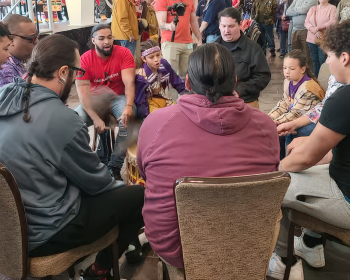Twenty-nine years after Mrs. Rose Lee Parks ignited the modern Civil Rights Movement by refusing to give up her seat on a bus in Montgomery, Alabama to a white person, the government of the United States, using the Bureau of the Census, is employing its own unique version of "back-of-the-bus" politics to America's ethnic multitudes.
Each and every ethnic group in the United States, regardless of its size and history, has the right to be officially accorded equal statistical recognition by our government. Such recognition is not simply a matter of courtesy or of scientific accuracy, it is a vital necessity which determines whether or not all the other civil rights belonging to members of any ethnic community living in the U.S. will be respected - by both the public and private sectors.
Yet through its adoption of inconsistent and arbitrary practices, the Census Bureau is violating the civil rights of all ethnic-American communities to equal treatment and recognition. This official policy of discrimination centers around the Census Bureau's definition and use of the term "Spanish/Hispanic."
Virtually non-existent in the census forms prior to 1970(*), this classification was further "clarified" for the 1980 census which declared in Appendix E, instruction number 7:
A person is of Spanish/Hispanic origin or descent if the person identifies his or her ancestry with one of the listed groups, that is, Mexican, Puerto Rican, etc. Origin or descent may be viewed as the nationality group, the lineage, or country in which the person or the person's parents or ancestors were born.
Thus, any individual acknowledging a "Spanish-speaking" state as his/her or an ancestor's country of origin, regardless of his/her race, language, religion or culture, will be classified as "Spanish/Hispanic." Again, although such a classification could be equally applied to numerous other collectives (to everyone who immigrated or whose ancestors immigrated to the U.S. from any English-speaking, French-speaking, or Slavic-speaking states, for example), such additional categories were not offered by the Census Bureau.
The "Spanish/Hispanic" option reveals an insensitivity, if not a complete disregard, by our government for the right of the various non-Spanish ethnic groups, especially American-Indians, who have immigrated to the U.S. from "Latin" America to have their identities fully acknowledged and equally respected.
In the Census Bureau's instructions, the categories of "American-Indian" and "Spanish/Hispanic" appear to be mutually exclusive. Though it is not clearly stated, it is possible for an American-Indian from "Latin" America to check both the "American-Indian" and "Spanish/Hispanic" options; or to write in "Mexican-Indian," "Mayan Indian," etc. in the category labeled "Other." However, no comparable category to "Spanish/Hispanic," such as "British/Anglophone" and "Gallic/Francophone," was provided as an option for the American-Indians from Canada and the United States. The Census Bureau, therefore, treats the same group - American-Indians - differently depending upon whether or not they live in or have immigrated from a Spanish-speaking state or a non-Spanish-speaking state. At best, the ethnic identity of those American-Indians associated with any Spanish-speaking state is circumscribed and qualified. Denied recognition as a distinct ethnic unit, they are viewed as but a facet of one "European" nationality: "Spanish."
It is interesting to note that the countries of Guatemala, Bolivia, Ecuador and Peru, where the majority of the population is American-Indian, demographically, linguistically, and culturally,+ are denied official recognition as American-Indian states. Instead, these countries are listed as "Spanish/Hispanic." Why? Because Spanish is the official language of these states? Then should not Guana, Nigeria, Uganda, etc. be classified, not as Black African republics, but as "British/Anglophone" states because English is their official language? And Senegal, Ivory Coast, Guinea, etc., should be recognized as "Gallic/Francophone" states for the same reason.
Are Guatemala, Bolivia, Ecuador, and Peru listed as "Spanish/Hispanic" states because the governments of these countries desire this specific classification? Or because certain elitist groups in those countries, and ours, want this type of recognition? Such domestic policies only provide encouragement to "Latin" American governments to pursue their attacks upon the language, culture, religion, even the physical existence of the American-Indians living within their respective countries.
The "Spanish/Hispanic" category is confusing and intimidating. Many American-Indian immigrants to the U.S. from "Latin" America are afraid to identify themselves as Indians. In their home countries to be Indian is to be discriminated against, as in Mexico, or constitutes a death sentence as it often does in Guatemala. Moreover, the category of "Spanish/Hispanic" impedes a true count of the American-Indian population in the United States, one purpose of the Census Bureau.
Congressional sanction for the "Spanish/Hispanic" concept has resulted in the violation of the ethnic rights of American-Indians by additional government agencies. According to reports reaching the Anthropology Resource Center, many non-Reservation American Indians of the United States, "Urban Indians," are being classified by some federal and state agencies as "Mexicans" or "Hispanics." In addition, many American-Indian refugees from Guatemala, even some American-Indian migrant workers from Mexico, have been reportedly listed by federal and state bureaus as "Mexicans" or "Hispanics."
What exactly does the term "Spanish/Hispanic" mean? It is not a geographic concept. Spanish-speakers principally live only in part of North America, in part of South America, and on only three of the Caribbean islands. It is not a racial concept. The population of the Dominican Republic is primarily black. Argentina, however, is considered the "Whitest" country in the Western Hemisphere. On the other hand, the majority of the population of Guatemala, Bolivia, Ecuador, and Peru is American-Indian. It is not an ethnic term. Italians form the plurality of the population of Argentina. There is a large German community in Chile, while in Peru a Chinese community exists. Throughout "Spanish" America there are communities of Arabs, Armenians, Basques, Catalans, English, French, Irish, Jews, Koreans, Poles, etc., in large and small numbers. It is not a linguistic concept. The non-Spanish immigrants possess their own mother tongues. Many, often most, American-Indians speak their own languages, not Spanish. Nor is it a cultural concept. Culturally, the population in these states; range from Argentina's European orientation to Bolivia's "Indianness."
By designating "Mexicans," "Cubans," Puerto Ricans," etc. as "ethnic" groups, the Census Bureau is declaring the state to be synonymous with ethnicity. It, therefore, follows that Czechoslovakia, Yugoslavia, Belgium, Switzerland, and the U.S.S.R., for example, are not just political entities, but also constitute distinct homogenous "ethnic" units as well.
The discriminatory nature of the "Spanish/Hispanic" category, however, extends beyond the issue of census forms and the right of all ethnic-American communities to be accorded equal statistical treatment. It affects the very existence of affirmative action. For many federal, state, and local government agencies not only accept the concept of "Spanish/Hispanic" but classify individuals who identify themselves as such - many of whom are white - as "non-white!"
Thus whites, provided that they are listed as "Spanish/Hispanic," are legally eligible to compete against blacks for those educational and job-related opportunities available through affirmative action programs. The result has been to impede the political and economic advancement of blacks. Miami is only the most noteworthy example of this situation.
It is imperative that the U.S. government seriously review its continued use of this term. If the government cannot employ the rationale it uses to justify the "Spanish/Hispanic" concept consistently, then the term should be dropped from all government usage.
(*) Prior to 1970, a "Spanish" identification option was only provided regionally for the states of the Southwest. With the 1970 census a redefined "Spanish" option was offered as a nation-wide category. On June 16, 1976, Congress passed Public Law 94-311 whereby it sanctioned and required the adoption and use of a "Spanish" identification option for the 1980 and future censuses.
(+) Depending upon the source, the American-Indian population of Ecuador and Peru is listed as a minority, a plurality, or a majority. This fluctuation can be attributed to how extensively the term "Mestizo" was employed. The term is usually applied to the American-Indians in these two countries, as well as throughout "Spanish" America, who work in the urban centers or who have adopted some article of Western apparel. The result is to significantly reduce the true size of the American-Indian population in Ecuador and Peru. Despite such questionable practices, it appear that the American-Indians in both states, nevertheless, constitute a significant percentage of the population, probably a majority, possessing a separate and distinct ethnic identity from the "Spanish." They thus have an impact, real or potential, on the policies pursued by their respective governments to a degree not found elsewhere in "Latin" America.
Article copyright Cultural Survival, Inc.



